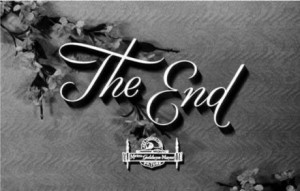Tuesday, May 13: High-Heeled Gumshoe
ONE MORE TIME
by Melodie Johnson Howe
 I am now on my sixth, seventh, eighth—I’ve lost count—draft of a short story titled, “A Hollywood Ending.” It’s the ending I’m having trouble with.
I am now on my sixth, seventh, eighth—I’ve lost count—draft of a short story titled, “A Hollywood Ending.” It’s the ending I’m having trouble with.
I’ve been writing long enough to know that the problem is not always where you think it is. In other words, I’m having trouble with the ending because something has gone wrong in the middle of the story. So I go back. Once again. It’s like constantly returning to a lover you’re no longer love.
In the first draft I thought I’d write a thriller. I got over that quickly when I realized that Diana Poole is not the kind of protagonist you can throw into a powerful, all consuming, thriller construction. It simply overwhelmed her character. So my thriller is now a suspenseful conversation between Diana and young woman who has broken into her house. Great. This is my territory. But the next couple of drafts were so bleak and somber even I couldn’t take it. I had lost my own personal style of writing and Diana Poole had become a morose middle-aged woman. Where’s my Zoloft?!
Should I put the story on the back burner and move on to something else? No. The story is gnawing at me, demanding to be fixed. I think longingly about other short stories that seem to have flown out of me almost intact. Or I am just imagining that?
So what keeps a writer going? Money? Yes. I certainly need the sale. I hear authors in our genre say they wouldn’t write unless they could make a living off their writing. But so few really do. Does that make the writers who earn a living better? Some are pretty damn good. But for the other mega-earners, I would walk two aisles over to avoid their books. And I secretly wish they would stop earning those big bucks and free up the shelf space. But what would they do with themselves? If they had a previous career such as a lawyer, or chef, or Indian chief they could go back to that. If you don’t want to write except to make money there must be a better career choice. I think it’s bravado when they say they wouldn’t write unless they could earn their living doing it. Maybe it makes them less vulnerable to those moments of sitting in the chair and not being able to make the story work—no matter how big the advance or how good the editor.
I have battled with depression my whole life. I’m talking real depression that puts you out of commission for weeks on end. And during those dark periods (I think Winston Churchill called depression The Black Dog.) I often thought about giving up writing. Depression sucks all meaning from your life. It’s murder without the physical death. It’s a lobotomy without the operation. Yet in my darkest moments it was the idea of writing, that flicker of the anticipation of creating that kept me going.
All writers are different, of course. But somewhere along the way the writer must become a pro no matter how much money he earns. The flicker of the anticipation of creating is just a flicker. A hope. It’s not the hard work of creation. Even God had to take a week to get things going and he’s still revising.
So I sit my in my office chair and reread the story for the umpteenth time because that’s what I have to do to get it right. And if it’s not right it won’t get published. Alas, getting it right doesn’t mean it’s my best effort. But it does mean it works as a story. The short stories that leap from the page and grab you around the throat and around the heart are few. But when they do happen it almost makes me want to give The Black Dog a pat. Almost.
And if it’s not right it won’t get published. Alas, getting it right doesn’t mean it’s my best effort. But it does mean it works as a story. The short stories that leap from the page and grab you around the throat and around the heart are few. But when they do happen it almost makes me want to give The Black Dog a pat. Almost.




















There is an old claim that stories are conceived in one of two ways: the writer sees the beginning of the story, or the writer sees the ending of the story, and its development follows from that initial conception. Nobody, apparently, is supposed to think of the middle of the story first.
(My ideas for stories usually don’t begin at the end or the beginning, but from some fact or concept I want to address; e.g., “The Apollo Progression” was dreamed up around the use of the marine chronometer, and “Black Spartacus” was intended to address slavery.)
One thing is very rare, though, and that’s the story coming out all at once. A story usually has be carefully nurtured like a kitten before it gets any bounce.
Slaying the Black Dog is not easy—been there—but you can slip a chain around its neck so it can’t get out of the yard. Writing helps.
The story will come.
If you have a broken arm, no one expects you to chop wood.
If you have a broken leg, no one expects you to run a marathon.
If you have a broken neural chemical balance, no one can see it. If you drop your pain-free mask, you’re told “you must love being depressed” and you’re advised to “snap out of it”.
Oddly, melancholy and dysphoria seem to facilitate creativity, whether fine art (van Gogh), music (Beethoven), or writing (Hemingway). I think the trick is to use it to your advantage while praying for relief from the unending pain.
You touched on something that so many “newer” writers fail to realize, and that’s the location of the problem.
I would bet that at least 90% of all problems with endings, or with most any scene, is because something went wrong earlier.
And for me, my best work has always come from the toughest executions. I find that stories I write – which came fairly easily – are some of my weakest, whereas the ones that nearly killed me are the strongest.
Give the doggie a treat.
Oh, and by the way, Chief Stands In Manure’s books are quite underrated.
First off, Melodie, thanks for your frank, always informative, personal & helpful talk about the craft of writing. SECOND: The Black Dog you mention was a lifelong companion of a couple of damn good friends of mine. So, I know that it’s not something you can “get over.” THIRD: Could the Diana Poole story not be working because Diana isn’t the person who experienced the thriller-in-question? Maybe she is the person being told the story by someone she has casually known in the business for years? (And then she starts investigating the story and all hell breaks loose…)FOURTH: I love the title “Hollywood Ending.” Remember, that every ending is a new beginning. And that when the Sun sets and night falls and day ends, something else starts.
Yours,
Jeff